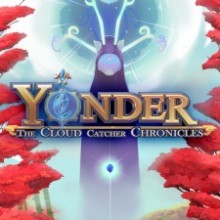Yonder: The Cloud Catcher Chronicles (PlayStation 4) Review
By Renan Fontes  17.07.2017
17.07.2017

The greatest adventures survive not just off of diverse content, but also from how they incorporate an identity into their world. Take The Legend of Zelda: Breath of the Wild for instance; it thrived because it was able to inject a unique identity into every aspect that made it whole. The gameplay and the open world were never not in sync, as they impacted one another equally. Clearly taking inspiration from Nintendo's latest hit, Yonder: The Cloud Catcher Chronicles sets itself up as a pacifistic journey of self-discovery. The question is, does Yonder discover an identity along the way, or does it simply get bogged down by an overreliance on homages?
Link waking up from the Shrine of Resurrection and overlooking the Great Plateau is one of the most iconic images to come out of this generation, so it feels incredibly tasteless when the player character steps foot on Gemea for the first time and the shot is recreated nearly 1:1.
Right out the gate, Prideful Sloth chooses to reference one of the year's biggest releases instead of creating an opening that's wholly unique to Gemea, because the fact of the matter is Yonder: The Cloud Catcher Chronicles can no longer exist independent of Breath of the Wild.

Homages aren't anything new to the video game medium, especially in a generation so reliant on nostalgia, but it becomes a problem when the games being homaged haven't even been out for half a year, which places the sincerity of the act under question.
Shameless pandering aside, Gemea is legitimately impressive when it comes to how it looks. The four-season structure allows the world to breathe and change naturally over the course of the story. Animals will migrate and the local plant life will change to correspond with the weather.
Add in a decision to keep the whole experience totally pacifistic and what's left is an adventure that easily could have had an identity of its own. The boons present in Gemea do nearly make up for the poorly timed and placed references, but Yonder has a much bigger problem: there isn't much to do.

Gemea isn't that alive once more time is spent exploring it. Villages and NPCs are severely underdeveloped, the pacifism ends up being a double-edged sword since it manages to be unique, but it doesn't offer anything to replace combat. Farming is too underdeveloped, villages offer no meaningful interactions, and going around the world discovering new items and planting trees simply isn't that engaging.
With very little in the gameplay department to offer, it's up to the story to pick up the slack. The plot is presented as a mysterious narrative about the main character's connection to Gemea, but since they're made in a rather generic character creator and entirely devoid of personality, the story falls flat on its face.
Of course, the self-discovery is more about what the player discovers about themselves than their created character, but that doesn't make the presentation any better or the writing any tighter. At the very least, the story does prompt further exploration of Gemea, and most areas are beautiful enough to just walk around in peacefully for a few minutes.

Progressing the story is a blend of completing quests and finding Sprites hidden across Gemea. Sprites can be used to clear murk, which act as the main progression checks, blocking areas or certain goods off until a specific amount have been collected. It isn't a bad way to encourage ample exploration, but it doesn't do much benefit the adventure aspect, either.
Bizarrely, Yonder uses a tank control scheme not unlike Resident Evil. Movement is smoother than in the survival horror titles, but the lack of fluid turning feels cumbersome. What makes it all the stranger is that there's nothing in the level design that would be benefitted by tank controls. In fact, modern movement would have only served to make Gemea more enjoyable to traverse.
Yonder is a great-to-look-at, hard-to-play addition to the adventure genre. On one hand, Gemea is gorgeous, and the soundtrack does a wonderful job at conveying mood and tone. On the other hand, Gemea is barren in terms of gameplay and mired in poor decisions, resulting in an incredibly unsatisfying adventure.

Cubed3 Rating
Subpar
Due to some rather questionable gameplay decisions and a lack of variety in content, Yonder: The Cloud Catcher Chronicles ends up being a disproportionately beautiful slog to nowhere. The tank controls are outdated without any of the design elements necessary to make them engaging, while the story tries to be an intimate journey of self-discovery without anything to discover. Gemea's lush and vibrant landscape is the one saving grace, and peacefully walking through colourful forests and past bustling rivers almost makes the whole shipwreck worth it - but the world's lack of complete identity, both in gameplay and how it presents itself, is too glaring to ignore. The shame of it all is that Yonder isn't held back by time constraints or a tight budget; it's held back by design.

![]() 4/10
4/10
![]() 0
(0 Votes)
0
(0 Votes)
 Out now
Out now  Out now
Out now  Out now
Out now  Out now
Out now Comments
Comments are currently disabled

 Sign In
Sign In Game Details
Game Details Subscribe to this topic
Subscribe to this topic Features
Features






 Top
Top

